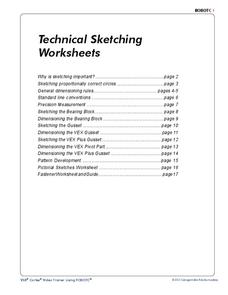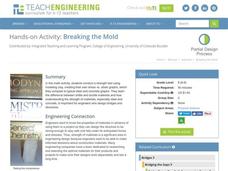AJ Reynolds
Unit 5 Section 2: Measuring Angles
An interactive assignment displays two example angles to teach how to measure them. When you click on the angles, a protractor appears! As practice, learners view a set of angles, estimate the size of each, and then enter the degrees in...
Teach Engineering
Earthquakes Living Lab: Finding Epicenters and Measuring Magnitudes
Pairs use an online simulation to determine the epicenter and magnitude of an earthquake. Using real data about the earthquake's maximum S wave amplitudes, they then determine the magnitude. The resource provides a great career...
Statistics Education Web
Saga of Survival (Using Data about Donner Party to Illustrate Descriptive Statistics)
What did gender have to do with the survival rates of the Donner Party? Using comparative box plots, classes compare the ages of the survivors and nonsurvivors. Using the same method, individuals make conclusions about the...
Teach Engineering
What is a Nanometer?
Teams learn about the size of a nanometer by measuring objects and converting those measurements. A worksheet then tests the groups' abilities to use nanometers by having them determine the size of objects that are too small to...
Curated OER
My Foot and the Standard Foot
Young mathematicians put one foot in front of the other as they learn how to measure length in an elementary math lesson. Using paper cutouts of their own feet, children measure classroom objects as they discover the importance of...
Teach Engineering
Building a Barometer
Forget your local meteorologist — build your own barometer and keep track of the weather with an activity that provides directions to build a barometer out of a narrow necked bottle, a glass, and some water. Using their barometer,...
Teach Engineering
Energy on a Roller Coaster
Roll with your class into the idea of conservation of energy. Pupils use a roller coaster track to collect data to reinforce the concept of conservation of energy and the influence of friction. Class members then create a graph from...
Teach Engineering
Android App Development
Building an accelerometer app for your Android device. Groups develop an app that uses the accelerometer on an Android device. The purpose of the activity is to reinforce the programming design. The post activity assessment challenges...
PBS
Working with Coordinate Planes: Assessments
It's time for scholars to show what they know about coordinate planes with a collection of three assessments. The exams' objectives include plotting points on a single grid, measuring using the distance formula, and identifying...
Curated OER
Reading Charts
How well can your third graders interpret data from a chart? Use this straightforward worksheet to reinforce problem-solving skills. After reading a school schedule, pupils answer ten questions about the information in the chart. A great...
Statistics Education Web
Text Messaging is Time Consuming! What Gives?
The more you text, the less you study. Have classes test this hypothesis or another question related to text messages. Using real data, learners use technology to create a scatter plot and calculate a regression line. They create a dot...
Teach Engineering
Magnetic Fields Matter
Help your young scientists learn which materials are affected by magnetic fields with an activity that presents the information about different types of materials — diamagnetic, paramagnetic, and ferromagnetic — and their interaction...
NASA
Rocket Wind Tunnel
Using a teacher-built wind tunnel constructed from a paper concrete tube form, a fan, and a balance, individuals determine the amount of drag their rocket design will experience in flight. Pupils make modifications to increase the...
Teach Engineering
Slinkies as Solenoids
What does an MRI machine have to do with a slinky? This activity challenges learners to run a current through a slinky and use a magnetic field sensor to measure the magnetic field. Groups then change the length of the slinky to see...
Teach Engineering
Earthquakes Living Lab: FAQs about P Waves, S Waves and More
Let's talk about earthquakes .... Using the Internet, pupils research what causes earthquakes, how scientists measure them, their locations, and their effects. The resource is not only informative, but it also builds crucial...
Carnegie Mellon University
Technical Sketching Worksheets
How do you create a technical drawing? Cover the basics of technical sketching with a few practice sketches of simple shapes. A technical sketching lesson introduces the proper precision measurement techniques. Pupils progress...
Teach Engineering
Water Remediation Lab
Water filtration — that's pure genius! Groups test the ability of a water filter to purify water by running chlorine contaminated water through a filter and measuring the chlorine concentrations as they filter the water. They then graph...
Teach Engineering
Edible Rovers
The good thing about building this rover is you get to eat it afterwards. Pairs determine rover parts they want to include in their design based upon their cost and usefulness. The teams design their rovers, build them from edible...
Teach Engineering
Exploring Acceleration with an Android
Small groups use rubber bands to accelerate an Android device along a track of books. They collect the acceleration data and analyze it in order to determine the device's velocity.
Beyond Benign
Ecological Footprint
How does your lifestyle measure up in terms of your ecological footprint? Young ecologists examine their impact on the planet using an insightful online calculator. A short quiz asks users to rank the size of their homes, their energy...
Teach Engineering
Breaking the Mold
A little too much strain could cause a lot of stress. Groups conduct a strength test on clay. Using books as weights, pupils measure the compression of clay columns and calculate the associated strain and stress. Teams record their...
Teach Engineering
Bridge Types: Tensile and Compressive Forces
Bridges rely on tension and compression to keep them standing. Pairs test this principle by constructing simple bridges and applying a force to the center. Teams use the provided instructional activity to record their...
Teach Engineering
Ice, Ice, PV!
Knowing the temperature coefficient allows for the calculation of voltage output at any temperature. Groups conduct an experiment to determine the effects of temperature on the power output of a solar panel. The teams alter the...
Teach Engineering
An Inflated Impression of Mars
Help your class understand the magnitude of the distance between Earth and Mars with an activity that asks small groups to use balloons to create scale models of the Earth, Moon, and Mars. Class members figure out the distances...























